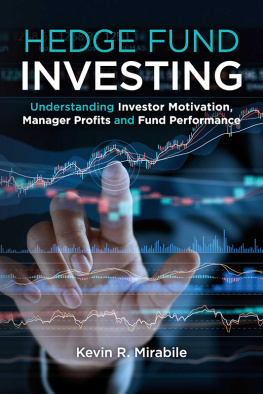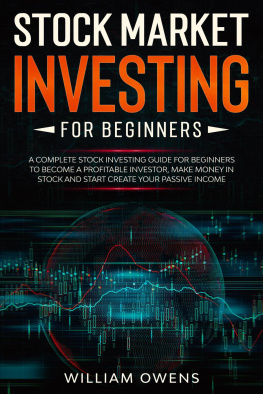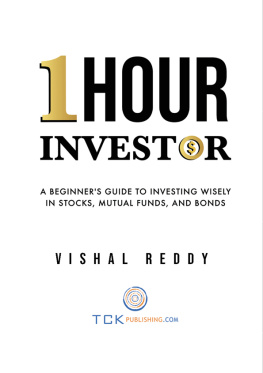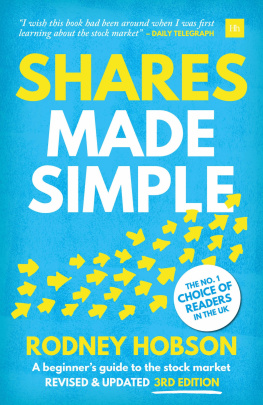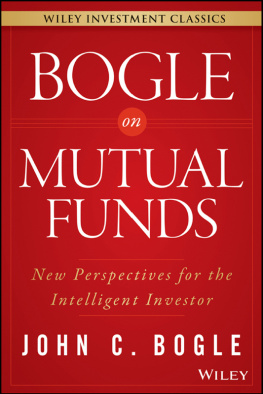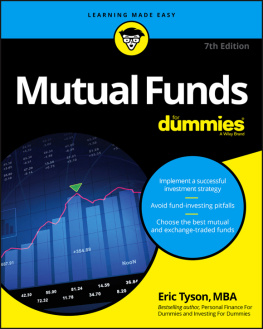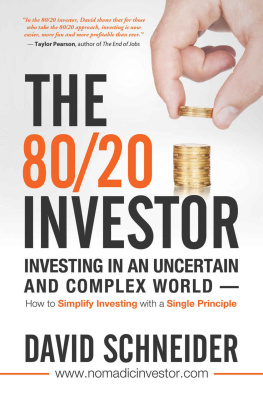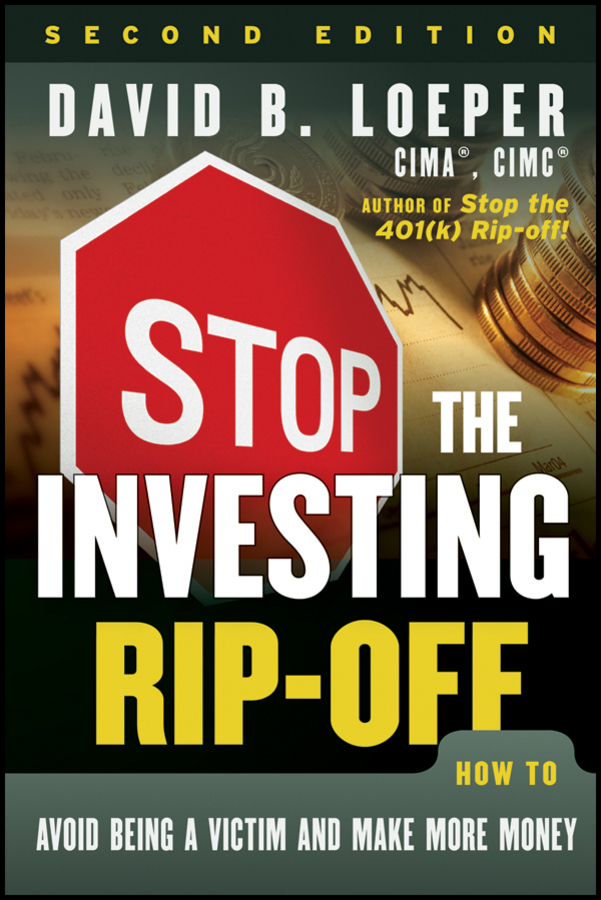Contents

Copyright 2012 by Financeware, Inc. All rights reserved.
The first edition of this book titled, Stop the Investing Rip-off: How to Avoid Being a Victim and Make More Money , was published in 2009 by John Wiley & Sons, Inc., Hoboken, New Jersey.
Published by John Wiley & Sons, Inc., Hoboken, New Jersey.
Published simultaneously in Canada.
No part of this publication may be reproduced, stored in a retrieval system, or transmitted in any form or by any means, electronic, mechanical, photocopying, recording, scanning, or otherwise, except as permitted under Section 107 or 108 of the 1976 United States Copyright Act, without either the prior written permission of the Publisher, or authorization through payment of the appropriate per-copy fee to the Copyright Clearance Center, Inc., 222 Rosewood Drive, Danvers, MA 01923, (978) 750-8400, fax (978) 750-4470, or on the web at www.copyright.com . Requests to the Publisher for permission should be addressed to the Permissions Department, John Wiley & Sons, Inc., 111 River Street, Hoboken, NJ 07030, (201) 748-6011, fax (201) 748-6008, or online at www.wiley.com/go/permissions .
Limit of Liability/Disclaimer of Warranty: While the publisher and author have used their best efforts in preparing this book, they make no representations or warranties with respect to the accuracy or completeness of the contents of this book and specifically disclaim any implied warranties of merchantability or fitness for a particular purpose. No warranty may be created or extended by sales representatives or written sales materials. The advice and strategies contained herein may not be suitable for your situation. You should consult with a professional where appropriate. Neither the publisher nor author shall be liable for any loss of profit or any other commercial damages, including but not limited to special, incidental, consequential, or other damages.
For general information on our other products and services or for technical support, please contact our Customer Care Department within the United States at (800) 762-2974, outside the United States at (317) 572-3993, or fax (317) 572-4002.
Wiley also publishes its books in a variety of electronic formats. Some content that appears in print may not be available in electronic books. For more information about Wiley products, visit our web site at www.wiley.com .
ISBN-13 978-1-118-13306-4 (paper); ISBN 978-1-118-17781-5 (ebk); ISBN 978-1-118-17783-9 (ebk); ISBN 978-1-118-17782-2 (ebk)
This book is dedicated to my father, the late Kenneth A. Loeper, who taught me to make sure that no one pushes you around. His passion for living his life, his ethics and integrity, his strength and empathy taught me the real meaning of virtue and integrity. I miss you, Dad, and I only wish I could have written this while you were still with us.
Preface
According to the U.S. Department of Commerce, the financial services industry (banks, brokerage, and insurance) represents more than 7 percent of the nations gross domestic product (GDP). If you think about this, the cost of these services is staggering. How can it cost us 7 percent of our total output each year just to manage and service our wealth?
In 2009, the GDP for financial services was $828 billion. (We are excluding real estate from the calculation to focus on banking, brokerage, and insurance and exclude home ownership and direct real estate investing which would more than double the figure.) Total U.S. financial assets stood at $40 trillion in 2009, meaning that the financial services industry as a whole is skimming 2 percent a year out of everyones wealth.
Some of these costs are obvious, like ATM fees, insurance premiums, mutual fund expense ratios, brokerage commissions, or investment advisory fees. Some are hidden or at least require some extreme effort to discover. As I mention in my book, Stop the Retirement Rip-off , more than 80 percent of people do not know what, if anything, they are paying in fees for their 401(k) plan according to the American Association of Retired Persons (AARP) and a study by the Government Accountability Office (GAO). New rules are going to soon fix this retirement-plan hidden-fee problem starting in 2012 and 2013 when participants receive fee-disclosure statements for their 401(k) that will put a lot of people into Retirement Plan Sticker Shock.
The OTHER Millionaire You Make
Say you and your spouse are 25 years old. You are a teacher and your spouse is a police officer. Your combined incomes are $75,000. Things are tight, but your parents taught you the value of compounding, saving for a rainy day, and retirement. Both of you have retirement plans through your employers with matching contributions, and despite the compromise to your lifestyle, together you defer $5,000 a year to your retirement plans. This is a little less than 7 percent of your income; far below what many advisers and financial gurus would advise with their common rules of thumb. Your employers match some of your contributions, which adds another $2,000 a year to your retirement savings, bringing your total annual retirement savings to $7,000 a year. Both working for the government, your jobs are fairly secure and your incomes will likely adjust for inflation each year along with your savings and matching employer contributions.
The good news is that after 40 years of compromising lifestyle choices to make these savings a priority, at a 7.5 percent return you and your spouse together would have accumulated almost $2.5 million! (The bad news is the effects of inflation are likely to have that $2.5 million only have the spending power of about $760,000 in todays dollars, but it is still an impressive nest egg for a middle-income family.)
But what about the financial services industry? What did THEY make on the 40 years of compromises to your lifestyle? You accumulated $2.5 million through diligent savings, and if your fees were 2.5 percent as is common in the industry, THEY would have made more than $1.7 MILLION on YOUR wealth!!! (See Appendix A.) Does it make sense for the product vendors to accumulate 68 percent of what YOU accumulate? They are not the ones compromising their lifestyle for 40 years. And, even at a more reasonable 1.5 percent fee, you and your spouse would still make them a millionaire. (See Appendix B.) No wonder the financial services industry is such a large part of our economy.
Think about the impact an extra $1,700,000 or $1 million would make to your life during your retirement. And keep in mind that in this example we are not talking about super-wealthy executives; we are talking about a schoolteacher and a policeman diligently making fairly modest savings over a lifelong career.
The financial-services industry is unique among all others. Most people are not fooled by infomercial charlatans (many are, though). They skeptically avoid magic diet pills that come and go with scientific-sounding names and double blind studies supposedly backing up their fantastic claims. They avoid miracle products not available in stores or free-for-a-limited-time offers (that require only a small shipping and handling charge). But most of the financial-services industry is not really any different. Somehow, the financial industry has been able to evade being painted with the brush other bogus products and services have, and in most cases they have been able to cast their sales spin and outrageous claims in a very different light. Somehow (through effective marketing), they have created a world where the impression in peoples minds is bifurcatedthat is, people perceive this industry as sophisticated, smart, and polished, while simultaneously (often more in ones subconscious) knowing them to be scandalous and justifiably worthy of a very high level of skepticism because deep down, consumers know that they are being sold.


